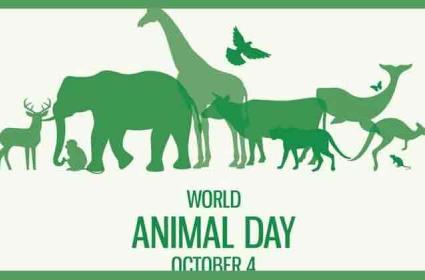The Pandemic Begs Urgent, Pan-India Action On Animal Welfare

By Atul Kothari, National Secretary, Shiksha Sanskriti Utthan Nyas
Mahatma Gandhi had said that the greatness of a nation and its moral progress can be judged by the way its animals are treated. We share the planet with a variety of flora and fauna and respect for nature is imperative. October 4 – World Animal Day serves as a good occasion to re-visit and review our farm policies and their implementation and, more importantly, what we the people are doing towards animal welfare.
India has the world’s largest cattle population, and cattle, along with other farm animals are an integral part of our lives. India is the world's largest producer and consumer of milk. Our cattle and the tradition of caring for them powered the white revolution. The past decade has seen unprecedentedly high instances of man-animal conflict. The global pandemic, which we continue to live through, is also the result of human apathy towards animals. We must realize that human beings cannot stay removed from their ecosystem and that we must urgently change for the better the ways in which we interact with it.
But not all is dark and gloomy. India has had a tradition of caring for animals and living in harmony with nature. We worship nature – animals and plants, rivers, and mountains – and have lived in harmony with nature for several millennia. What the pandemic teaches us is to get back to our roots and traditions.
There is growing ecological consciousness, which must be encouraged. The importance of animal welfare is not lost to those in governance. India is leading the implementation of the One Health concept, which recognizes that animal and human health are interdependent. In fact, the Department of Animal Husbandry and Dairying, Government of India has embarked upon establishing the One Health approach to leverage human capital and physical capital to prevent future pandemics. While numerous steps have been taken to promote the concept of One Health across nations, as well as in India, we must recognize the urgency to implement this concept now, more than ever, as we continue to live through
the pandemic. The pandemic has hindered the progress of all development indicators. The One Health approach shall help in the early detection, prevention, and control of public health emergencies (like Covid-19) and the mitigation of endemic zoonotic infections. The pandemic helped raise awareness about zoonotic diseases that can hamper global social and economic health. Experts have said that the COVID-19 is not the last pandemic. The next pandemic is imminent unless we work to prevent it. For this must positively look at addressing human-animal interactions. With development activities increasing across India, man-animal interactions have increased. This has increased the possibility of the transfer of diseases that originate in wild animals. We need well-thought-out animal welfare strategies to positively manage the outcome of these man-animal interactions and control the spread of zoonotic diseases. The One Health Approach enables administrators to act to address this concern and plan for the better health of animals and human beings.
I firmly believe that technology has answers to a lot of our problems. Here too, countries are utilizing software to monitor and improve animal health. The global animal health monitoring software market is estimated to reach 1.3 billion US dollars by 2026, growing at a compounded annual rate of 8.32%. The world, including India, is trying to evolve technological solutions for animal health and wellness. India’s startup ecosystem, the world’s third-largest, is devising technology-driven solutions in this domain, solutions which are enabling large-scale impact.
What is also important is to realize that ensuring good animal health helps us directly achieve nine of the 17 sustainable development goals. But technological innovation must be accompanied by innate compassion and respect for nature. Another essential ingredient to ensure holistic animal and human health is active collaboration among all stakeholders – civil society organizations, corporates, government, and the general public. It is important that we Indians defer to the experience and wisdom of our ancestors on animal health. Compassion for nature and other life forms will define the future of mankind. Caring for animals can dramatically improve human prosperity and quality of life.



















